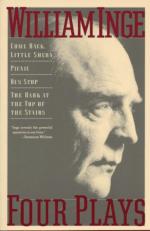|
This section contains 296 words (approx. 1 page at 400 words per page) |

|
Picnic Summary & Study Guide Description
Picnic Summary & Study Guide includes comprehensive information and analysis to help you understand the book. This study guide contains the following sections:
This detailed literature summary also contains Bibliography and a Free Quiz on Picnic by William Inge.
Picnic is based on an earlier short play by William Inge, Front Porch, written in 1952. This predecessor was a fragmented character study of several women. In using Front Porch as the basis of Picnic, Inge expanded upon the female characters to include several male figures and a more developed plot.
Picnic was a success with audiences when it opened on Broadway in February, 1953. It also earned significant praise from critics, winning the Pulitzer Prize for Drama, the Outer Circle Award, the New York Drama Critics Award, and a Donaldson Award. The movie adaptation in 1955 expanded the story's appeal and garnered two Academy Awards, a Golden Globe Award, and a listing as one of the ten best films of 1955. Inge's exploration of small town life, his focus on family relationships, and his depiction of the loneliness that permeates so many peoples' lives struck a chord with 1950s audiences and has continued to do so in the decades since Picnic's debut.
Because he was writing about subjects with which he was familiar, Inge's plays deliver an authentic tone. The role of alcohol and sexual impropriety is a common theme in his work, which serves as a contrast to the American Dream image so familiar to 1950s audiencesthat of white picket fences surrounding perfect people leading perfect lives. The women in Picnic are all looking for a way to escape the boredom and loneliness of their lives, and the men of the play are confused and unsure of what they want. While embraced by mass audiences for its superficial charms, critics lauded Inge's play for its much darker themes. Picnic has come to be regarded as a pioneering drama for its frank depiction of sexuality and its subliminally cynical take on the "love conquers all" hypothesis.
Read more from the Study Guide
|
This section contains 296 words (approx. 1 page at 400 words per page) |

|



